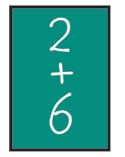Most FASD students have significant learning problems in mathematics; it is typically the most challenging academic subject. Mathematics relies on several areas that are weak for many FASD students: problem solving, abstract thinking, memory, sequencing, and generalizing. The abstract concepts of time and money are particularly problematic. In addition, basic problem solving and computation skills can be difficult.
It is rare to be able to “see” brain abnormalities that underlie specific learning disabilities, but with newer imaging technologies, we now know which areas of the brain are important in mathematical calculations. When FASD children were imaged by a technique called DTI (Diffusion Tensor Imaging), the 5 areas in the brain important in mathematical ability showed damage–and the amount of damage correlated highly with their math scores on standardized tests. This is a great example of how structural damage can be associated with a learning disability. Mathematical life skills should be the goal for the student who has demonstrated difficulty learning math. The FASD student may have the following difficulties with mathematics:
- No real understanding of what a number is and what it represents
- Difficulty with basic math skills (relies on calculator or fingers)

- Confusion with math symbols
- Unable to remember where to begin working on a problem (left-right, right-left)
- Difficulty understanding math vocabulary
- Confusion when many math terms are used for the same concept (addition, total, sum, all together, in all)
- Overwhelmed by too much on a page
- Confusion when to use a math operation or concept
- Inability to read, understand, or solve word problems
- Inability to determine which strategies to use for word problems
- Difficulty with number sequencing
- Unable to quickly locate a page in a textbook